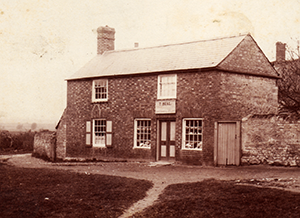Kerfies, Cleggies and all that.
 Our Nene Valley families.
Our Nene Valley families.
The River Nene played a significant role for our early 19th century ancestors. The river was an important navigable waterway, allowing for the transport of goods such as coal, corn, and other commodities. It was navigable for about 88 miles (142 km) from Northampton to The Wash. Towns like Wisbech thrived as ports along the river, facilitating trade and commerce.
The river also provided essential water for irrigation, supporting agriculture in the surrounding areas. The river supported the growth of industries, including milling and manufacturing, by providing a reliable water source. Its associated trade routes created jobs for many people, including watermen and tradesmen involved in the transport and handling of goods.
The River Nene was a vital artery for the region, contributing to its economic development, agricultural productivity, and trade networks in the early 19th century so you can see why our families migrated up and down the river.
Beal
The Beal surname is unusual in that it probably originated from several different sources and converged to the same or similar spellings: Beal, Beale, Beals etc. The suggested sources, all of which are likely, include:
- A Norman variant of the word belle, meaning fair or handsome.
- The Old English derived one from bēo-hyll or bee-hill.
- In Anglo-Saxon areas, from the Scandinavian word for farm, bøli.
Consequently, there is no single hotspot for the name in the British Isles, although it is more popular in some areas.
Our Beals were a quite well-to-do family from the part of the River Nene between Wellingborough and Peterborough. Clearly well educated, they went from being Yeoman farmers to bookbinders, stationers and then on to grocers and other retail. Thomas Beal began life as a stationer, bookbinder and seller, but seems to have diversified during his lifetime to be a general dealer. Thomas was also a Wesleyan lay preacher for all his adult life.
As the industrial revolution progressed, one son, William Henry Beal, became a sewing machine importer and retailer and moved to Halifax for reasons I've not discovered. Following his father's entrepreneurial flair, he did well and built an impressive shop, "Whitehall", on the corner of Cornmarket and Russel Street in Halifax town centre.
Beeson
The name is believed to be from Nottinghamshire where there is a town called Beeston. There are concentrations of Beesons there and around the East Midlands and also in Buckinghamshire for some reason.
Our Beeson ancestors were living in Barnack and Southorpe during the 18th century. They were mostly farmers until William Beeson began a blacksmith business in nearby Yarwell. Talking to the lady that lived at the forge in Yarwell, we gathered that it wasn't just a blacksmiths, but a coachmakers business. Adjacent to the forge was a large barn where the coach making went on.
It was William's daughter, Alice Phebe Beeson, who married William Henry Beal and moved to Halifax.
Charles Henry Beeson, Alice Phebe's brother, is worth a look. He had three wives (not at the same time) who were all sisters!
Langley
Langley is another surname derived from a placename. It so happens that there are several places named Langley so the name is fairly evenly distributed.
Ann Langley was William Henry Beal's mother. Ann came from Little Harrowdwden near Wellingborough. Her family were also from a farming background but maybe not quite as wealthy as some of the other Nene Valley families we've looked at.
Peak
Our Peak family was a well established family name in Yarwell. Again, a habitational name and, as you'd expect, not confined to one area of the UK. It's not a common name but there are concentrations around Lancashire/Cheshire/Shropshire, North Devon, and the counties around The Wash.
I haven't done a huge amount of work on this family. It's likely, given their location, they were involved in agriculture and/or associated trades.